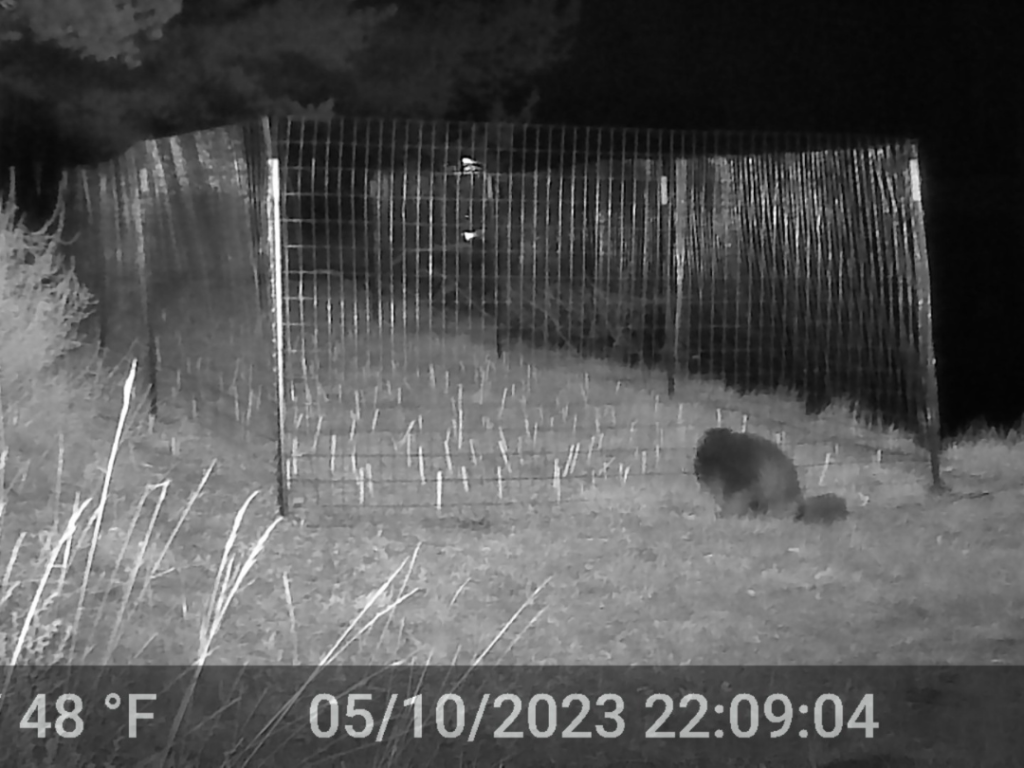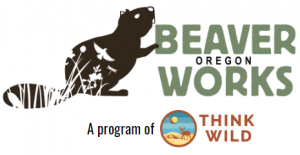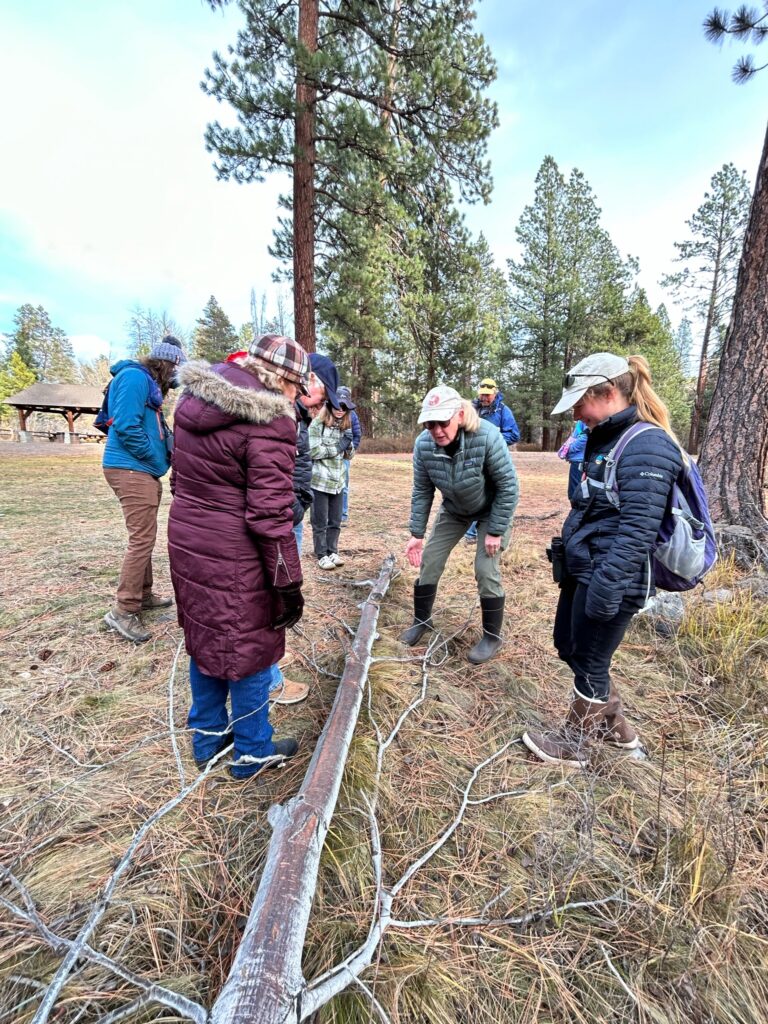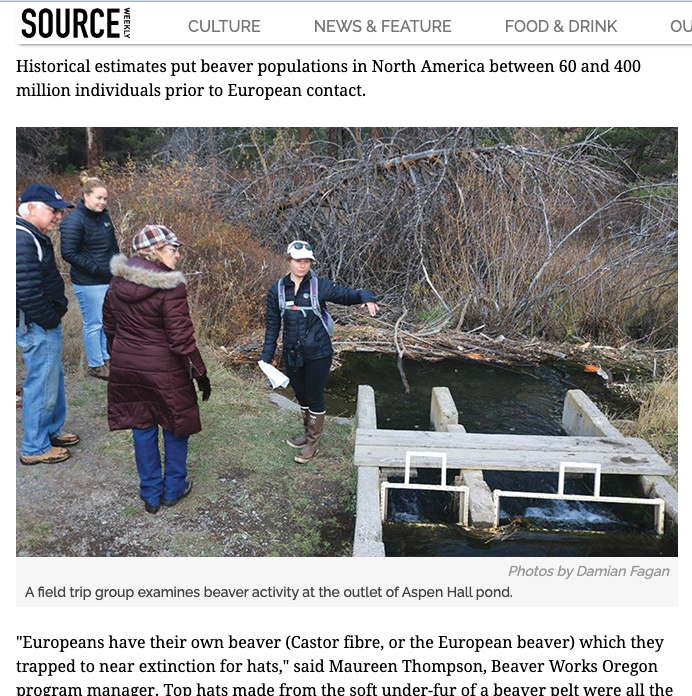2023 Year in Review
2023 was a big year for beavers in Oregon and for Beaver Works Oregon!
Read on to learn about the progress Beaver Works Oregon made this year in raising awareness of beaver as a keystone species and promoting their success on our high desert landscapes.
Dr. Maureen Thompson - New Beaver Works Program Manager Hired
In 2023, Think Wild’s Beaver Works program hired a full time program manager, Dr. Maureen Thompson, to conduct expanded outreach and education, workshops and professional development events, and numerous beaver habitat and coexistence projects on public and private lands in Central and Eastern Oregon.
Maureen is an ecologist with a diverse background, having worked for government agencies, non-profits, and consultancies around the US and abroad. Although she has experience with a range of species, her primary interest lies in beavers. She holds a B.S. from The Evergreen State College and completed her MS at Oklahoma State University, focusing on bat mortality at wind farms. In 2023, she earned her PhD from the University of New South Wales, studying frog ecology using citizen science data. In her role as the Beaver Works Program Manager at Think Wild, Maureen coordinates projects, outreach, and policy work related to beavers. She actively participates in various national beaver-focused groups and is involved in advocacy, funding analysis, and social science studies to support beaver conservation and coexistence.
Learn more about Maureen’s background and her current role here.
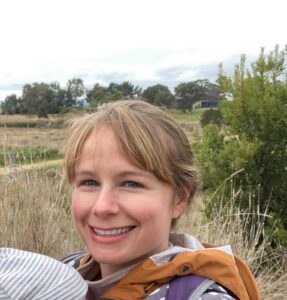
Beaver Habitat Installations
Beaver Works habitat implementations this year included plantings, beaver dam analog (BDA) installations, site visits, fencing, and project monitoring on private and public lands.
- We planted over 2200 native riparian stick “starts,” including cottonwood, dogwood, and willow, as well as over 500 potted native plants, at new planting sites at Collier Memorial State Park, Tetherow Crossing Park, and on private lands in Post, Oregon.
- We fenced off these new plantings with temporary enclosures that will remain in place for 3-5 years to prevent human disturbance and wildlife browse until they are fully established. At this point, they will serve as an important food and shelter resource for beaver and other riparian wildlife alike.
- We also led volunteer crews to install 6 BDAs in Ochoco National Forest, harvested 3500 willow and cottonwood sticks throughout Central Oregon, and planted 5000 sticks in a new nursery site in Clarno, Oregon. The new nursery will serve as a critical resource for sticks for future planting projects.
- We continuously monitor the success of these implementations for up to 3 years via seasonal camera monitoring and planting success counts at Shevlin Park, Tetherow Crossing Park, and Collier Memorial State Park.
- We have a dedicated citizen scientist monitoring trail cameras at Shevlin Park in Bend. Trail cameras are a great way to view beaver activity and behavior, the wildlife that use beaver modified habitat, and to witness priceless interspecies interactions.

Beaver Conflict Mitigation
Between August and November, Beaver Works staff performed six beaver-specific habitat consultations and three beaver mitigation consultations with proposals in progress for 2024 implementation projects. We also responded to a local resident’s concerns about a beaver felling his trees and installed tree fencing on the remaining trees to protect them.
With the enactment of “Beaver Bill” HB3463, Beaver Works expects an increase in demand for our mitigation services in 2024. We look forward to providing professional support to Central and Eastern Oregonians affected by this new bill and offering cost-effective coexistence solutions to landowners.
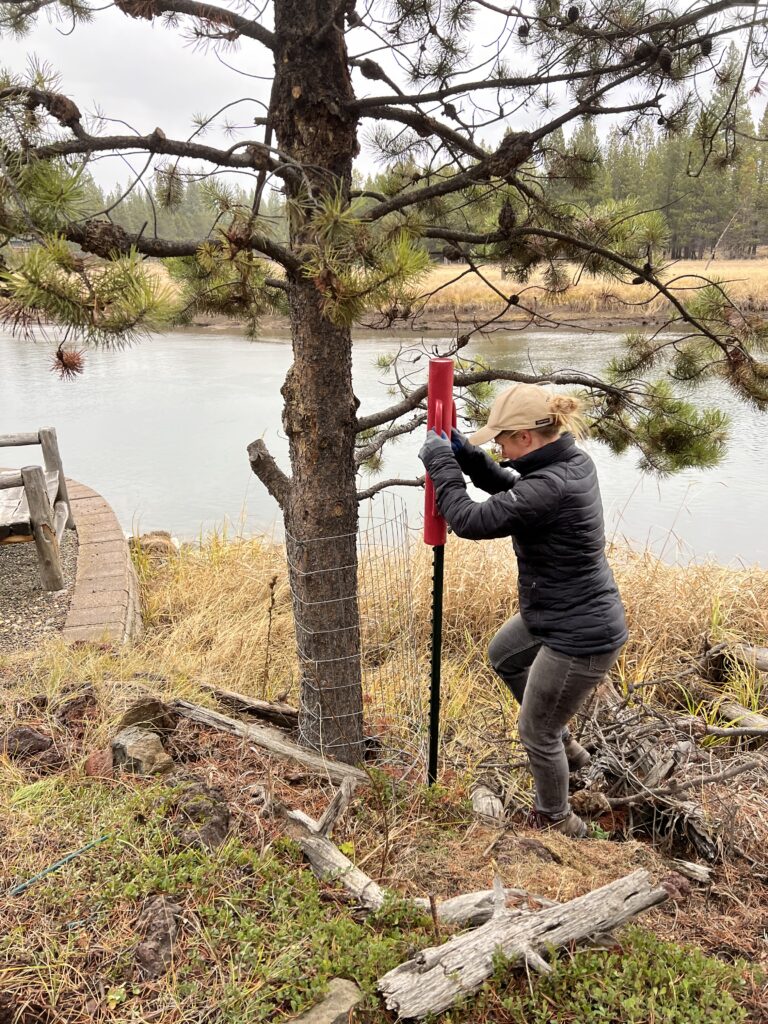
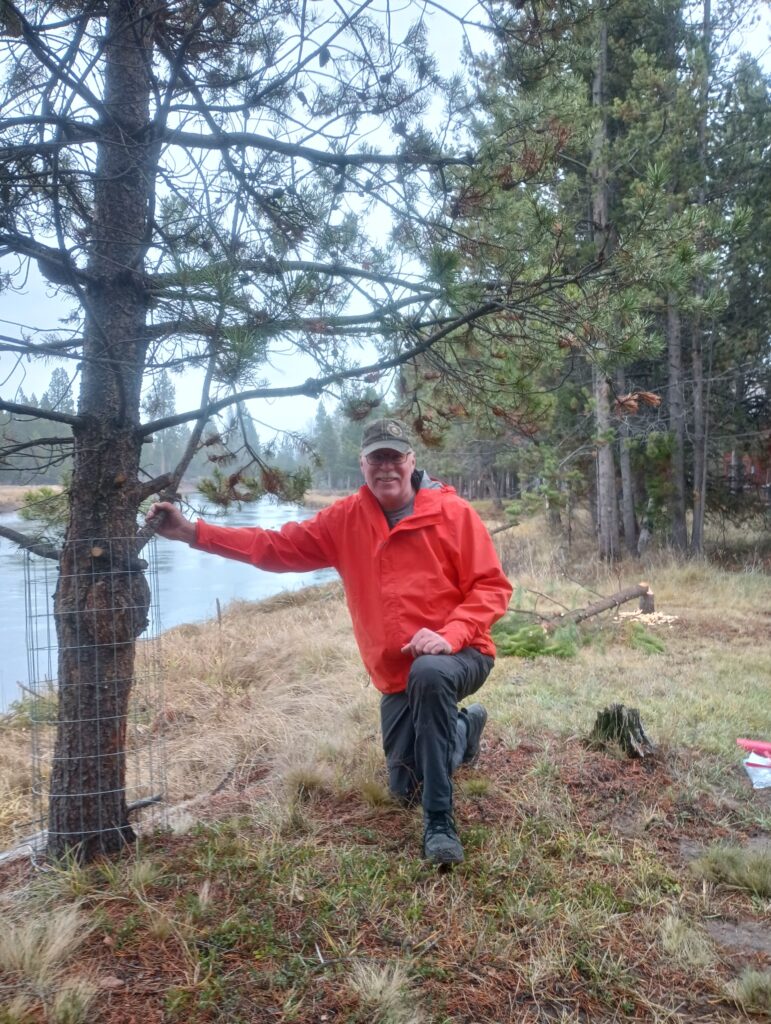
Beaver Outreach and Education
Outreach activities in 2023 included beaver and wildlife habitat and conflict support service advertisements in regional publications, website blogs and page additions, social media, pamphlets and flyers, signage in local parks and at planting sites, Google Ads, and direct mailings to 1200 recipients in Central and Eastern Oregon.

We also conducted email outreach to river- and stream-adjacent homeowner associations, Soil Water and Conservation District representatives, and NGOs throughout Central and Eastern Oregon to offer collaboration opportunities, workshops, habitat services and technical support.
Our education activities included guided public beaver walks and presentations, including at a Tetherow Homeowners Association meeting, Indian Ford Watershed meeting, Golf Course Superintendents Association of Oregon conference, Sisters Trail Alliance guest speaker series, Great Old Broads for Wilderness meeting, and Central Oregon Association of Realtors meeting on beaver and related wildlife coexistence. Beaver Works also has a long feature in the Source Weekly.
Professional Development and Training
In 2023, Beaver Works staff participated in the Beaver Institute Beaver Corps training to learn about best practices for beaver conflict mitigation including flow devices, tree protection, and other infrastructure solutions that support successful human-beaver coexistence.
We also attended the Oregon SageCon Restoring Riparian Habitats and State of the Beaver Conferences, and have been invited to present at the River Restoration NW Conference in 2024 “to highlight how our three pronged approach to supporting beavers addresses human elements that limit restoration success.”
Beaver Works Partners
Beaver Works partners with many different agencies and organizations to best serve beavers and humans in Oregon. Here are some of our key partners and their roles:
- Oregon Parks and Recreation District/Oregon State Parks: collaborate on project identification, permitting, planning, funding, and implementation on state park lands
- Oregon Department of Fish and Wildlife: shares resources related to beaver management, refers potential beaver conflict customers to Beaver Works, responsible for implementing and upholding new beaver rules related to HB3464
- Burns Paiute Tribe: collaborate on project planning on tribal lands
- Humane Society of the United States: provides outreach and information about humane wildlife interactions to the public
- Oregon Natural Desert Association: collaborates on best practices for beaver habitat projects in high desert habitats
- The Beaver Institute: provides training on best practices for beaver conflict mitigation, facilitates beaver coexistence knowledge and skill-sharing
- United States Forest Service: provides native plant nursery space and collaborates on project site assessment
- Bend Park and Recreation District: support beaver monitoring efforts at Shevlin Park and collaborate on public education and outreach opportunities
- Redmond Area Park and Recreation District: support habitat restoration and education efforts at Tetherow Crossing Park.
- Soil and Water Conservation Districts: collaborate on project planning and funding, sharing information with landowners
- Private Landowners: utilize Beaver Works Oregon for beaver mitigation and habitat projects on private lands, supporting improved beaver habitat connectivity at a watershed scale. Work on private lands enables us to make change at biologically relevant scales and we couldn’t be more grateful to all the landowners reaching out to partner as land stewards.
Thank You To Some of Our Major Funders
Thank you to the following foundations and many private donors that make the work by Beaver Works Oregon possible.
- Broad Reach Foundation
- Kirby Jones Foundation
- Bella Vista Foundation
- The Oregon Conservation and Recreation Fund
- META
2024 Major Plans
Many of this year’s workshops, presentations, and implementation projects that were a result of increased outreach have planted seeds that are quickly expanding to larger multi-year projects and partnerships. For example, our project at Collier Memorial State Park has evolved into a multi-year partnership with Oregon Parks and Recreation Department that will involve plantings and coexistence projects at Collier and La Pine State Parks in 2024-25. Three separate private landholders near La Pine State Park that received our postcards are interested in beaver-related projects in 2024-25 as well, promoting local connectivity across our projects.
Our participation in an Oregon Semaphore Grass planting in coordination with Portland Audubon and Burns Paiute Tribe has led to us planning a Beaver Dam Analog installation project in the Malheur River Watershed, a project that will help improve beaver habitat and fish passage for interior redband trout and other native fish.
We also expect an increased demand for beaver conflict mitigation assistance in 2024 due to the newly enacted HB3464. We plan to work closely with ODFW to offer non-lethal alternatives to beaver extermination for people experiencing conflicts with beavers.
Beaver Works will also continue to offer education and outreach to the public, as well as local and regional organizations and agencies to increase awareness of the importance of beavers on our high desert landscape. As attitudes toward beavers shift, we are well poised to meet increased demand for beaver habitat workshops, resources, and education around coexistence strategies, supporting beaver population recovery in Central and Eastern Oregon.
Many of our plans for 2024 depend on grant funding. As we look ahead to this upcoming year, we are pursuing grants that would open up new projects in habitat restoration, outreach, and coexistence solutions. We are hopeful that we will continue to see increased recognition and prioritization of projects like ours, which utilize nature-based solutions to address the climate crisis and promote ecosystem resilience. Stay tuned throughout the year to learn more!
